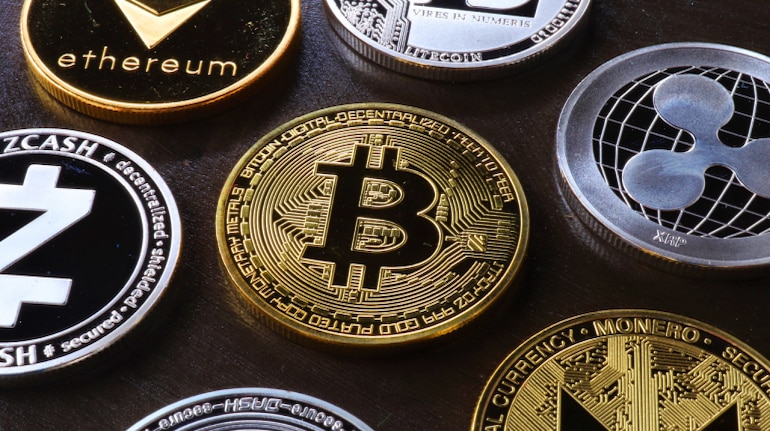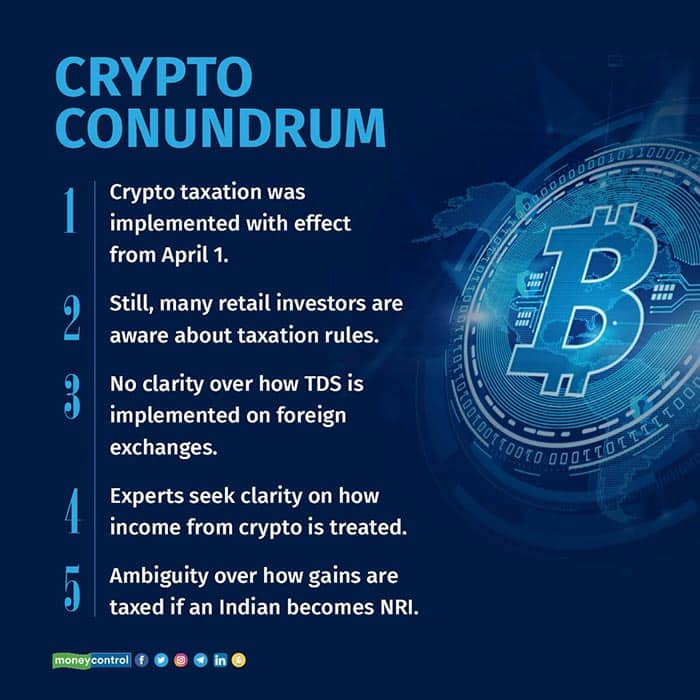



The taxation framework for crypto assets, or virtual digital assets (VDAs), which was introduced by the government on April 1, has made both investors and traders more cautious about this new asset.
In the 2022-23 union budget, the government had said that gains arising out of crypto assets would be taxed at 30 percent irrespective of the individual’s income tax slab rate. In addition, a 1 percent tax deducted at source (TDS) was made applicable on transfer of such assets.
Crypto investor Priya Ratnam believes that a lot of people investing in crypto are already in the highest income-tax bracket of 30 percent. “The TDS is a concern for frequent traders, like intra-day and short-term traders. If you transact more than 10-15 times, it freezes up quite a bit of capital,” says Ratnam, CEO, Avisa Games Guild, a Web3 gaming guild.
Unaware investor
Thanks to the breakneck rally in crypto assets millions of Indians have poured billions into these digital assets. Data with CoinGecko, a digital currency price and data platform, showed that bitcoin has delivered a return of 24,980 percent since 2013, while ether is up 2,89,801 percent since 2015.
Not just metros, tier-I and tier-II cities have contributed substantially to the demand for crypto assets. KoinX, a platform that helps calculate and provide crypto tax reports, has around 60 percent of its customers from tier-II cities such as Patna, Bhubaneshwar, Ranchi, Jaipur, and Mohali.
However, experts flag that even after eight months of the implementation of crypto taxation, not many are aware of the rules.
“A lot of people still believe that when they convert their crypto and withdraw it into their bank account, only then are taxes applicable,” said Punit Agarwal, Founder, KoinX.

Taxation gaps
Government rules state that events such as crypto transfer or withdrawal from one’s wallet and putting it in that of another are taxable. Further, it is the buyer’s responsibility to report capital gains arising out of crypto assets. Also, rules mandate that the buyer of a VDA to ensure that tax is deducted at source at 1 percent of sale consideration.
To make life simpler for users, Indian crypto exchanges deduct TDS by default on every trade on their platform, but the international ones do not.
“People assume that trades on international exchanges do not attract TDS. However, there is no clear position articulated by the government about TDS or taxation if a person is trading on an international exchange,” said Agarwal.
Navigating complexities
Then there’s the issue of computing and calculating the quantum of taxes. Experts warn that since gains in one crypto asset cannot be offset against losses in another, investors should keep in mind that they have to pay taxes at the rate of 30 percent on every instance of capital gains.
Indy Sarker, co-founder of TaxCryp, said, “There are lots of complexities around tax calculation. A sizeable crypto investor’s chartered accountant might not be equipped to deal with hundreds and thousands of transactions. There are CAs who ask for all your bank statements, and that’s way more information than they need.”
Sarker shared that in some instances investors have received a quote for up to Rs 1 lakh from CAs to file someone’s crypto taxes.
Tax experts feel that there is not much clarity in terms of how different types of crypto transactions are to be treated.
“ITR forms have three sections for income from VDAs. One is under `capital gains’, one is under `business income’, and the third is under `special income.’ Which transaction is to be classified under what category is something that needs clarity,” said Agarwal.
For example, there’s not much clarity in how crypto airdrops would be treated. Airdrops involve sending tokens to the wallets of individuals, either for free or in exchange for a small promotional service.
“Say, I got one crypto token, which has a price of Rs 1 lakh. If I sell it for Rs 1.5 lakh, will the additional Rs 50,000 or the entire Rs 1.5 lakh be treated as capital gains? Would it be considered special income? Clarity on these classifications is expected, along with clarifications around the GST aspect of things,” added Agarwal.
NRI factor
There’s also ambiguity over the chargeability of VDAs.
Indian taxation is based on the principle of the residence of the person and the source of income. Worldwide income of Indian residents is taxable in India. Non-residents, however, are subject to source-based taxation, meaning only amounts received or accrued, or deemed to accrue or arise in India are subject to income tax in India.
“Currently, the Income Tax Act does not contain any provision to identify the situs of VDAs. VDAs being intangible property, the judicial pronouncements on the situs of an intangible property may be referred to determine the situs of VDAs,” said Naveen Wadhwa, Deputy General Manager at Taxmann.
For legal jurisdiction or taxation purposes, situs means the place to which a property belongs.
For example, there is not much clarity on how gains from crypto will be taxed if an Indian investor becomes a non-resident Indian (NRI).
Given the lack of clarity over many aspects of crypto taxation, experts suggest that investors would be better off in taking a CA or tax portal’s help in filing their taxes for this year. They also suggest that investors keep a record of all trade reports and each transaction of the past five-seven years in case a tax scrutiny arises.
Discover the latest Business News, Sensex, and Nifty updates. Obtain Personal Finance insights, tax queries, and expert opinions on Moneycontrol or download the Moneycontrol App to stay updated!
Find the best of Al News in one place, specially curated for you every weekend.
Stay on top of the latest tech trends and biggest startup news.